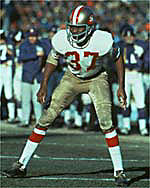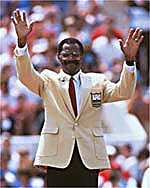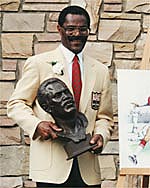Question & Answer with Hall of Famer Jimmy Johnson
Hall of Famer Q&A archive
 |
Week 14: JIMMY JOHNSON
Enshrined in 1994
(UCLA)
CORNERBACK 6-2, 187
1961-1976 San Francisco 49ers
49ers' No. 1 draft pick, 1961. . .Played on offense, at safety before moving to cornerback permanently, 1963. . . Blessed with outstanding speed, leaping ability. . .Named All-Pro four times. . .Selected to five Pro Bowls. . .Career record: 47 interceptions, 615 yards (both were 49ers records). . . Opposition passers avoided throwing in his area. . .Played in two NFC title games. . . Born March 31, 1938, in Dallas, Texas.
![]()
 |
|
A No. 1 draft pick in 1961, Johnson was selected to five Pro Bowls and named All-Pro four times. |
I attended every game you played between 1970 and 1976. My second all-time favorite game (I've been to every home game since 1970) was 1971. It was a rainy Sunday and the Niners had to win to win the Western Division championship. It was against Minnesota. Niners were at the south end zone ready to score. Six seconds left on the clock and the announcer just told the crowd that the L.A. Rams had just lost. If we scored a touchdown, we were the champions. Brodie threw a touchdown to Dick Witcher. The crowd went wild. Do you remember that particular game and is it one of your favorites also? Thank you for many memorable games you gave to many fans. You were an outstanding athlete. - Louise Koenig
JJ: Yes, I do. I do remember that particular game. I remember it particularly well because Dick Witcher was a very good friend of mine and had gone to UCLA. And, Dick had been not only a tight end position wide receiver but also a spread end - he was a dual character in that respect. I was just elated at the fact that we had won the game, number one, and was able to continue in our pursuit of hopefully getting to the big bowl. So, that is a favorite of mine, as all victories are favorites. If you have a victory, it's a favorite game needless to say. But, because Dick Witcher was a former UCLA Bruin, I had been with the 49ers several years before he got there, so we connected after he got there as an alumnus of UCLA. Witcher was, like I said, a real fine wide receiver as well as a tight end. And, to be very honest, I don't know exactly whether he was playing tight end or wide receiver at that particular time of catching the ball. But, I know he could wreak havoc running patterns on the strong safeties and weak safeties of the league. So, yes that was an outstanding victory for 49er history and I was glad to be a part of it.
How much were you influenced by your brother, Rafer, both in competition and in life? - Thank you, GFC
JJ: I tell you what - I have not been influenced by anyone more than my brother Rafer. To be very honest, I must give him credit for all the achievements that I've made. It has to come through him really because he was not only a fantastic brother, but he was a leader in high school, and in college. And, not only on the athletic side but on the academic side. And, because of what he did going before me, he set one heck of a wonderful pattern for me to follow and he was always there for me if I needed to run something by him. He presented me when I was at the Hall of Fame. I chose him to present me because, like I said, he was number one in my life as far as a brother and someone to follow.
Jimmy, In 1963, how were the 2-12 49ers able to beat the Bears when no one else was able to? - Brian Manthey, Milwaukee
JJ: The Bears have always been a very difficult team to beat for the 49ers. Whether our record was fantastic or whether it was on the low side, as is the case with what you just mentioned. I don't think it was the case of how we were able to beat them. In retrospect in my thinking, we just came into the game in the right frame of mind, we had prepared well, and we just put out an effort across the board that we were able to beat the Bears. But, the Bears have always been perennially tough guys, and have always been very difficult for the 49ers to play. But, in that particular case, our week's work just brought us to the point to where it gave us the chance to be victorious and we were.
Hello Jimmy - Even though opposing quarterbacks avoided throwing into your area, which quarterback and receiver were the best you ever faced? - Rich from Point Pleasant
JJ: Well, to pick out the best that I ever faced would be very, very difficult to do because, as a player, I was very competitive and from week to week, I just relished the opportunity to go against the powers to be in the NFL in reference to players. But, there were a lot of players that I admired. From the quarterback position, I guess, the quarterback that I probably admired more over the years than any, and he was the one I played my first professional game against - was when we played Johnny Unitas and the Baltimore Colts. And, over the years, there's been a lot of pretty incredible quarterbacks. But, when it comes down to the x's and o's, and how to handle defensive coverages and whatnot, Johnny Unitas would be for sure in the number one spot. But, Sonny Jurgensen was a wonderful quarterback. Roman Gabriel of the L.A. Rams was a dynamite quarterback and he would come at me, as would Johnny Unitas. I guess the bottom line would be any quarterback that would bring some balls my way, my admiration for them went way, way up. Because, as you know and I know, the game plan is to go where you can get the most bang for your buck and a lot of times that wasn't over my way. But, quarterbacks like Jurgensen, Bart Starr, Johnny Unitas, Roman Gabriel - they would break that plan and they would come at me so I appreciated that tremendously.
The receiver part - again, I was very aggressive as a defensive cornerback. And, it didn't matter who was coming at me, I was just out there to my job 100 percent. But, receivers that I enjoyed covering - I guess, in the top of that slot would be Tommy McDonald. I followed Tommy's career - in fact on my way up through college and high school when he was going to Oklahoma. So, Tommy McDonald would be in the number one slot in reference to just enjoying the competitive point of view and just liking to work against him. But, there were many - Paul Warfield was another great wide receiver. Fred Biletnikoff from the Raiders was a tough guy. Jimmy Orr from the Baltimore Colts. Pat Studstill from the Detroit Lions. There were a lot of great guys out there. I think I'm just blessed to come along at that time to be able to work against that caliber of wide receiver.
Which were your least favorite places to play and why? - Thanks, Deb DeMartini
JJ: Well, I'll tell you, one of my least favorite places to play - probably, there were two or three. It was in Detroit, Green Bay, and Minnesota. And, we played a game in Cleveland once upon a time that was nightmarish to say the least. But, anytime you get into the cold weather, the snow areas where you have to put up with the elements, and it makes playing the game of football even more difficult, those are the places that come to mind off the top of my head.
 |
|
Johnson said Hall of Famer Tommy McDonald was one of the hardest receivers to cover. |
Who was the fastest receiver you ever covered in the NFL?
JJ: "Bullet" Bob Hayes who played for the Dallas Cowboys. Without a doubt. "Bullet" Bob was an Olympic gold medallist in the 100 meters so he had all the speed in the world to burn so you had to set up an entirely different game plan to cover him. But, after working against "Bullet" Bob for a couple of times, I kind of gauged his speed and I was able to cover him ala normal. And, ala normal is giving him six to seven yards and either playing him to the outside or inside and working with him from those parameters. Whereas most defensive backs would give him 15 to 20 yards; in other words they'd be 15 to 20 yards off of him so to kind of let that cushion of 20 yards work for them in reference to not being beat deep. But, after covering him a couple of times, I was able to give him the normal setup on the coverage. But, still yet, "Bullet" Bob would probably have the most fantastic speed, and the most threatening speed of any guy that I ever covered.
Jim, I followed the 49ers since 1946 and my memory isn't what it used to be (must have been the fog at Kezar). Was there ever a plan to put you in the offensive scheme? If so, by whom? Thank you. - Ed Koprowski
JJ: Oh, absolutely. In fact, when they drafted me out of college, they actually drafted me as a wide receiver. I played wide receiver and defensive cornerback at UCLA. They told me out of the blocks, 'we want you as a wide receiver.' So I was scheduled to come to the 49ers and be a wide receiver. But, unfortunately for me, my career kind of took a turn. I dislocated my left wrist and broke my arm in a practice session back at Northwestern University preparing for the college All-Star game where the college players played the professional team. And, that year, the Philadelphia Eagles were the NFL champions and so we were supposed to play them in this All-Star game and, like I said, I broke my left arm and I dislocated my left wrist. So, I was not able to play in that particular game. And, the funny part about it - the dislocation of the wrist wasn't discovered by the X-rays that were taken back in Evanston. Therefore, I went for a little more than a week with a dislocated wrist thinking that it was just a broken arm. I got back to the West Coast, Dr. Milburn - the 49er doctor - scoped it out and discovered that I had a dislocated wrist. Instead of operating, they manipulated it. They'd put me under, manipulate, put me under, manipulate, and they did that about three or four times. They got all the bones back situated. And, so therefore I had a cast on my arm and I could not play wide receiver that particular year so I just worked out on defense. But, the next year I went to offense and of course, having the ability to play offense and defense, I went back to defense when they needed me because of injuries. I went back and forth for four years before I got the opportunity just to be a defensive player. But, I caught, I think it was my second year I was the number two receiver for the 49ers. I think I caught something like 36 balls for 675 yards. So, I did get a shot over there but I knew I was a defensive ball player and when I got the true opportunity to get settled in, I chose the defensive left corner position and I stayed there for the 12 remaining years of my career.
Jimmy, What is the most memorable moment from your professional football career?
JJ: Oh wow. I would have to say it was when I was inducted into the Hall of Fame, which came 16-plus years after I'd gotten out of the game. But, that's the top of the curve when it comes to accomplishments. And I just thank my lucky stars that I had the endurance, shall we say, or the staying power to stay in people's minds, voters' minds, over the many years I was out of the game, and finally in the Class of '94, I got the news that I was inducted into the Hall of Fame. I tell you what - it doesn't get any better than that!

